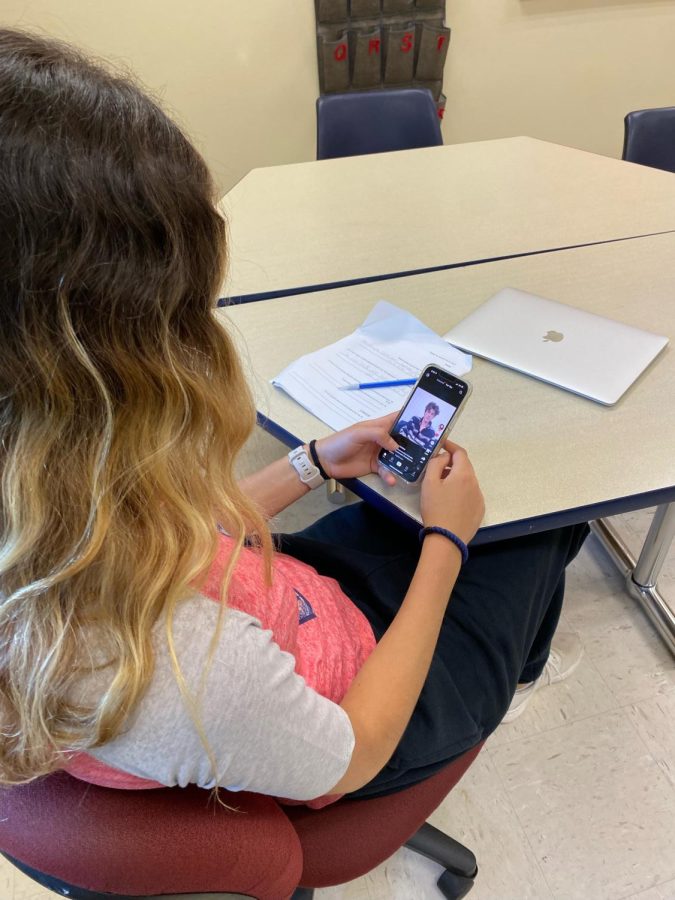The danger of TikTok
Junior Talia Sporkin scrolls through her Tik Tok feed.
June 3, 2022
Many teenagers find that it’s quite easy to get addicted to TikTok. Junior Tory Boles is no exception. They spend hours scrolling through brief videos, dipping into the comments to add their opinion and connect with people who have similar interests.
Tiktok users have a nearly endless arsenal of content at their fingertips – videos of dogs jumping into pools, cookie decorating, complex dances, professionals divulging secrets of their field, comedy routines, jokes about TV shows and more.
TikTok consists of videos that range from five seconds long to three minutes long, each one personally curated to the user’s interests. TikTok’s algorithm is designed to be addictive. It collects data on the content that its users like, save and share, which alters the content that users find on their feed. It contains both a “Following” page with content from creators that the user follows plus a “For You Page” with content that the algorithm recommends for that specific user.
According to NBC, in 2021, 63% of Americans between the ages of 12 and 17 used TikTok on a weekly basis. It overtook Instagram in popularity among teenagers and became second only to YouTube on this scale.
“It’s a nice distraction and another added benefit is finding TikToks I can relate to, which I can talk to people about in the comments…” Boles said. “They’re little spurts of serotonin.”
Although many teenagers view TikTok as a cure to their boredom, others view it as something far more menacing. It can be considered a business that capitalizes on its users’ boredom to subtly incorporate advertisements or other messages that fit the company’s agenda.
“These apps are a business, not a service,” high school guidance counselor Rachel Soifer said. “Your role in using them is to be a consumer and therefore, by definition, you are being manipulated in some way for someone else’s purpose at all times. It’s important to experience yourself away from that role and feel your natural sense of self.”
Soifer recommends that students spend some time away from social media. She said that while TikTok is a great platform for entertainment, it can also be harmful when overused or misused for harassment, bullying or the spread of misinformation.
Despite the rising popularity of TikTok, sophomore Alec Silberg does not feel the need to download the app. He said that he can get all of the entertainment and communication that he needs through Instagram alone.
“I don’t need another way to waste my time…” Silberg said. “I would probably end up using it too much if I had it or I would get addicted.”
TikTok does pose some benefits in addition to simply entertainment. Its format of curating videos presented to users on their “For You Page” allows creators to gain viewers more easily.
“It’s easier for things to spread on TikTok,” Silberg said. “You see things going viral and more people can voice their opinions, like you don’t need 10 million followers for your video to get 10 million views.”
This accessibility makes TikTok extremely popular among creators to showcase their work. Musical artists, dancers, authors and visual artists can go viral overnight and find their big break more quickly than ever before.
Sporkin is a prolific singer and songwriter who uses multiple social media platforms to publicize her music. While TikTok presents an opportunity to artists like her, she said that this supposed accessibility can also create a barrier for emerging artists.
“Unless you go viral or have a large social media presence, record companies won’t invest time or money into you. That controls who gets exposure and who is going to be at the top of the charts…” Sporkin said. “I feel a lot of pressure to post my songs on social media and I feel the need to be writing so many songs so I can keep posting them.”
Like any platform, TikTok has both positive and negative effects on its users. It can expose them to new ideas and forms of creativity, but it can also detach them from their real lives and surroundings. Scrolling can be relaxing and entertaining, yet with time, it can become addictive. Soifer advises students to acknowledge this duality and be smart about the way that they use social media.
“Your actual experiences and actions in the world are so much more valuable than an amusing video or any other thing you can find online,” Soifer said.








